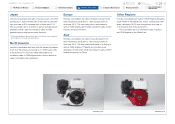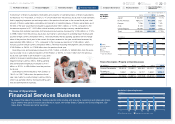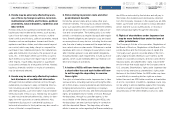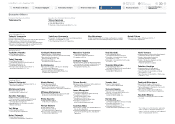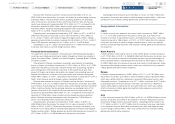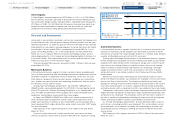Honda 2014 Annual Report Download - page 26
Download and view the complete annual report
Please find page 26 of the 2014 Honda annual report below. You can navigate through the pages in the report by either clicking on the pages listed below, or by using the keyword search tool below to find specific information within the annual report.
4. Honda may be adversely affected by wars,
use of force by foreign countries, terrorism,
multinational conflicts and frictions, political
uncertainty, natural disasters, epidemics and
labor strikes
Honda conducts its businesses worldwide and such
businesses may be affected by events, such as wars,
use of force by foreign countries, terrorism, multina-
tional conflicts and frictions, political uncertainty, natural
disasters such as earthquakes, tsunami and floods,
epidemics and labor strikes, and other events beyond
our control, which may delay, disrupt or suspend the
purchase of raw materials and parts, the manufacture,
sales and distribution of products, the provision of ser-
vices, etc., in the region where such events occurred.
Such events occurring in one region may in turn affect
other regions. If such delay, disruption or suspension
occurs and continues for a long period of time, Honda’s
business, financial condition or results of operations
may be adversely affected.
5. Honda may be adversely affected by inadver-
tent disclosure of confidential information
Although Honda maintains internal controls through
established procedures to keep confidential informa-
tion including personal information of its customers
and relating parties, such information may be inadver-
tently disclosed. If this occurs, Honda may be subject
to, and may be adversely affected by, claims for dam-
ages from the customers or parties affected. Also,
inadvertent disclosure of confidential business or
technical information to third parties may also result in
a loss of Honda’s competitiveness.
6. Risks relating to pension costs and other
postretirement benefits
Honda has pension plans and provides other post-
retirement benefits. The amounts of pension benefits,
lump-sum payments and other post-retirement benefits
are primarily based on the combination of years of ser-
vice and compensation. The funding policy is to make
periodic contributions as required by applicable regula-
tions. Benefit obligations and pension costs are based
on assumptions of many factors, including the discount
rate, the rate of salary increase and the expected long-
term rate of return on plan assets. Differences in actual
expenses and costs or changes in assumptions could
affect Honda’s pension costs and benefit obligations,
including Honda’s cash requirements to fund such obli-
gations, which could materially affect our financial con-
dition and results of operations.
7. A holder of ADSs will have fewer rights than
a shareholder has and such holder will have
to act through the depositary to exercise
those rights
The rights of shareholders under Japanese law to take
various actions, including exercising voting rights inher-
ent in their shares, receiving dividends and distributions,
bringing derivative actions, examining a company’s
accounting books and records, and exercising appraisal
rights, are available only to holders of record. Because
the depositary, through its custodian agents, is the
record holder of the Shares underlying the ADSs, only
the depositary can exercise those rights in connection
with the deposited Shares. The depositary will make
efforts to exercise votes regarding the Shares underlying
the ADSs as instructed by the holders and will pay to
the holders the dividends and distributions collected
from the Company. However, in the capacity as an ADS
holder, such holder will not be able to bring a derivative
action, examine our accounting books or records or
exercise appraisal rights through the depositary.
8. Rights of shareholders under Japanese law
may be more limited than under the laws of
other jurisdictions
The Company’s Articles of Incorporation, Regulations of
the Board of Directors, Regulations of the Board of Cor-
porate Auditors and the Company Law of Japan (the
“Company Law”) govern corporate affairs of the Com-
pany. Legal principles relating to such matters as the
validity of corporate procedures, directors’ and officers’
fiduciary duties, and shareholders’ rights may be differ-
ent from those that would apply if the Company were a
U.S. company. Shareholders’ rights under Japanese law
may not be as extensive as shareholders’ rights under
the laws of the United States. An ADS holder may have
more difficulty in asserting his/her rights as a share-
holder than such an ADS holder would as a shareholder
of a U.S. corporation. In addition, Japanese courts may
not be willing to enforce liabilities against the Company
in actions brought in Japan that are based upon the
securities laws of the United States or any U.S. state.
Honda Motor Co., Ltd. Annual Report 2014 25
5 Corporate Governance
1 The Power of Dreams
2 Financial Highlights
3 To Our Shareholders
4 Review of Operations
6 Financial Section
7
Investor Relations
Information
Return to last
page opened
Go to
contents page








